- Home
- Hilary Mantel
Eight Months on Ghazzah Street Page 12
Eight Months on Ghazzah Street Read online
Page 12
Frances took a sip of her herb tea. It had a bitter taste, which she couldn’t place. “What is it?”
“A family recipe.” Yasmin relaxed. “My mother should be here to make it for you. My poor mother. She has been on one short visit since I was married, but she has the family, she is kept very much occupied. Raji’s mother, of course, is a widow. He is always the favorite son.”
“I have the impression you don’t get on.”
“In Pakistan it is unknown for the wife and the husband’s mother to agree.” Yasmin made a minute rearrangement of the folds of her long skirt. “Whatever I do for him can never be enough. And that is only the starting point. That is the rule laid down before we begin.”
“You must stand up to her.”
Yasmin laughed shortly. “I cannot. That is not our culture.”
“Why do you let your culture make you suffer? Can’t you break out of it?”
“And besides, it is me, it is not just our culture, it is me, myself, Don’t you see that? I am not married until twenty-nine, an old maid as you say. Oh, my family is good, the best—in origin we are Persian, Frances, did you know? But then again I am tall and have a long nose and have got myself overeducated. Let me tell you, the fight for Raji was long and expensive. And only then because his fiancée died … So you see, I am lucky to be a daughter-in-law at all.”
“I thought education was valued in Pakistan.”
“So it is, but then there are certain things which go along with education, as you know yourself, that if they reach the ears of young men make your value slip a little.”
“Like what?”
“Like asking questions,” Yasmin said. “Like arguing. Like praying too much.”
“Do you pray too much?”
She shook her head, emphatically. “No. It is just a perversion of the Prophet’s real message to believe that women have a secondary kind of soul.” Frances put down her cup. “Some more?” Yasmin said politely.
“No thanks.”
“It’s nasty, but it’s good for you. You will soon feel better.” She smiled.
In the hall, seeing her out, Yasmin picked up her dupatta and draped it over her head. “My driver is coming,” she said. “There is a big party tonight and I am going, so I must be taken to the bank to get my jewels out.”
“Oh, women will be there?”
“Yes. But of course we will have our own party. In our own room.”
Crossing the hall, Frances was angry with herself. Yasmin made her feel clumsy; yet she seemed to want to explain things to her, and sometimes, in an obscure way, she seemed to be asking for help. But what way could that be? Of course she can’t break out of her culture, Frances thought. No more can I break out of mine. No more would I want to; no more does she.
Frances Shore’s Diary: 24 Safar
All right, so I will put down what Andrew told me about the empty flat. I suppose I was being stupid and paranoid last week. Who on earth would want to read my diary?
Andrew was told by someone at Turadup that the flat is kept empty for the use of the Deputy Minister’s brother. He is a married man, and meets a married woman here. It seems it’s a long-running affair.
Even Yasmin had to admit, it does go on. Even in the Kingdom people aren’t perfect. I don’t suppose they have much alternative to setting up an arrangement like this. As Andrew says, they can’t go to a hotel, can they? I suppose they can meet each other outside the Kingdom, but then even if they have their husband’s permission to go abroad, women here don’t travel without a retinue of relatives. Only it seems so risky.
I wonder if Yasmin knows? Or the people upstairs? Is it just gossip at Turadup (because Turadup pays the rent for the whole block) or is it gossip among the Saudi men as well, down at the Ministry? Is it a thing that happens so seldom that everybody’s terrified? Or so often that people just raise their eyebrows and giggle?
And where did they meet? How do a couple meet, and strike up a relationship in the first place, if Saudi social life is what people tell me? How do they get to the stage of having an affair?
I asked Andrew all this and he said he didn’t know. He said that people at Turadup don’t really talk about it. You’re told, but just so that you don’t put your foot in it. I said to him, is it true? He said, of course it’s true, why would anybody want to make it up?
Then I wondered if my questions were naïve. You have to understand that there’s a lot of hypocrisy, Andrew said. You mustn’t believe the picture you get from the newspapers.
When Yasmin got home from the bank with her jewels she phoned me up. She quite often phones me, it’s easier for her than getting dressed up to walk across the hall. She said there was something she’d forgotten to tell me. What is it? They don’t actually stone the woman to death, she said. Not nowadays. They just throw a few stones, as a ritual, and then somebody shoots her.
This cheered me enormously. I had to bite my tongue to stop myself saying, oh well that’s all right then, isn’t it, very merciful. Yasmin probably wonders why I’m pursuing the topic with such energy. What if this couple made enemies? I try to imagine the four male witnesses, swaying about on ladders outside Dunroamin. But the blinds are always down in the empty flat. There’s not even a chink you could peer through. You’d have to charge down the door. The more you think of it the more ludicrous it becomes.
But I wonder when they come here, at night or during the day? I wonder if they are in love? Perhaps one day I shall see a car draw up and the lady slip out, in her veil, and glide silently up the stairs. If I see her I shall press myself against the wall, as if I were a servant, and turn my face away. She has enough to worry her.
Rabi al-awal
1
“Wait till the rain comes,” Samira said. “Then you will see some shooting up. Even that old tree.”
At eleven in the morning, Samira’s sitting room had a twilit air; a heaviness in the atmosphere, a preponderance of fringes and beadings, gold tiebacks on the velvet curtains, and wallpaper of crimson flock. There was a scent of mothballs, spices, of lemon spray polish, and the ineradicable smell of onions. A lamp in the shape of a clipper ship glowed dully on the sideboard. At one end, sofas were grouped about a glass coffee table; at the other end, made insignificant by the dimensions of the room, stood a dining table and twelve chairs in the ornate and gilded style known unkindly as Louis Farouk.
The large window, fronted by its balcony, looked on to the street; but the brown tree blocked the view, and made the room dark. Neither Yasmin nor Samira minded spending their days under artificial light, and it was often midmorning before they would wind up the heavy slatted wooden blinds. And it was overcast today, the low sky seeming to press on the city’s half-finished buildings. A chill damp blast from the air-conditioner stirred the pendant crystals of Samira’s chandelier—which had been obtained, she said, as part of her marriage settlement, from Top Furniture of Palestine Road.
Frances shivered a little. “Oh, you are becoming one of us,” Yasmin said. “You feel the cold.”
Samira crossed the room and turned the air-conditioner to a lower setting. She asked, “Would you like a shawl?”
“Thank you, I’m fine,” Frances said, with a formal courteous nod, and, vying with her in politeness, Samira said,
“It’s no problem.”
“When will it rain?” Frances asked. “It hasn’t rained since I got here.”
“She misses her English weather,” Yasmin explained.
Samira looked doubtful. It seemed she would do everything she could to entertain her guest, but there were some things she could not guarantee. “Oh, soon,” she said. And then, compelled to honesty, she added, “There isn’t any fixed season for it.”
“But when it does rain,” Yasmin said, “I promise you it will rain hard.”
Frances sat on the edge of her armchair, her thin ankles wrapped tightly together, and even her voice sounding thin, constrained. It seemed impossible to relax; and the other two w
omen looked wary, as if they thought a chance utterance might cause offense. Whereas really, Frances thought, it was much more likely that she would upset them. Every day she bridled at something, but she did not think of herself as the one offended. That was a step she had yet to take.
Samira went to the door, and spoke; and a moment later the maid hurried in, yellow face downcast, and handed Frances a shawl. “There, much better,” Samira said, leaning forward to arrange it around Frances’s shoulders. She gave her a brief, affectionate pat. Her child, Fat’ma, played on the floor with Selim. She was a sturdy infant, bigger than Selim though younger by some months; she wielded a plastic skittle which she used as a weapon, sometimes pounding the carpet, sometimes pounding the small curly-haired skull of Yasmin’s child. Selim’s cries of pain and protest were no more than squeaks, as if rigidly suppressed by a code of good manners. “He must grow up hardy,” Yasmin said. “He is a boy.”
“What’s your maid’s name?” Frances asked.
Samira told her. But she was no wiser. It sounded like “Sarsaparilla.” But that was not possible. In answer to her questioning look, Samira merely shrugged. “I did try to call her something simpler,” she said. “But she won’t answer to it.”
Sarsaparilla came in again, with a tray of coffee, and Samira stood up, took it from her, and put it on a sidetable, Frances tried to catch the maid’s eye; perhaps she might, just with a look, express her concern? But she failed. The girl slid out of the room, seeming to melt into the shadows of the heavy furniture, the gilt tassels, and out into the hallway with its bitter chemical tang of insecticides. “Nescafé freeze dried,” Samira said, with no little pride. “Not Arabic coffee. No sugar?” She made a face. “Frances, how can you?” She made another, more expressive face, for Yasmin’s consumption.
Samira was a sallow, stockily built young woman, with a cascade of coarse dark hair that had something of an animal quality about it—as if it led a separate life from its owner, but on a lower plane. As she arranged the cups, it swung over her shoulder, crackling with static. She wore blue jeans, tight-fitting, very new and stiff, and a scarlet sweatshirt with a designer’s monogram on the collar. On her left hand she wore a single carat solitaire diamond, in a surprisingly restrained setting; it blinked coldly in the gray light, like another eye.
“I was telling Frances,” Yasmin said, “that your maid has left some children behind in Indonesia. That is why she goes about crying the whole time.”
“She’s new, is she?” Frances asked.
Samira shrugged again. “Not so new. I am training her. Not easy, as she doesn’t speak any language. I just take her arm and I say, look you, do this. She is learning.”
“Well, she must speak some language,” Frances said.
“If she does nobody has found out what it is.”
“Does she come from Bandung?”
“No. Some country place.”
“She must have her own dialect.”
“Well, I don’t know, I think she must,” Samira said. “My friend has Indonesian maid, and she cannot speak to her.” She dropped three spoonfuls of brown sugar into her coffee, and stirred it thoughtfully. “I expect maybe she is lonely.”
“Oh well,” Yasmin said. “It is better if she doesn’t have any contacts. At least she won’t go bringing gangs of thieves to the house.”
“Are there gangs of thieves?” Frances said innocently. “I didn’t think there were any. It never mentions them in the newspapers.”
The two women exchanged a glance. It’s funny, Frances thought, how two people think they can exchange glances without the third person noticing. “It’s not a problem,” Samira said. She sounded prim. But then she added, hotly, “It is only in the West that they say, thieving Arabs. It is the Western media. Always they show us as thieving and ignorant and suffering from diseases.”
“Oh, I didn’t mean …” Frances blushed faintly. “Besides, they don’t, you know. Not nowadays.”
“They are fair to the East?” Yasmin said. “I don’t think so.”
“But I’m sure people don’t have those prejudices.”
“It is in the Saudi Gazette,” Samira insisted. “Every day people are taken up in Marks & Spencer. They try to explain, no, no, I am not a thief, I am intending to pay for it, I am only taking it to that counter over there.” Her face lit, as she enacted the scene; her coffee cup trembled a little in its saucer. “Perhaps they have never been in that country before. Perhaps their English is not so good. But no one listens to their pleas. They are thrown into jail. And then they are asked huge sums of money, far more than what is the value of that original article.”
“That can’t be right,” Frances said. She tried to keep her tone light. “They couldn’t arrest them, because you see, they’d have to be outside the shop—”
She stopped. Samira had set her jaw firmly. “Many people who own shops in London,” she said, “are Zionists.”
Frances nodded vaguely, not in assent, but because she was remembering what she had been told by the businessman on the plane. You have to cut the labels out of your underwear … too bloody secretive to have maps … nobody knows the half of what goes on. How long ago that seemed now; and yet this was only her third month on Ghazzah Street. Yasmin and Samira exchanged another glance, and this time, a slight smile.
“I have told Samira of your interest in the Sharia law. You must read the Holy Koran that I gave you. Then you will see how sensible it is.”
“I have been reading it,” Frances said.
“Of course, you do not get the full idea in translation.”
“You get enough.”
“And?” Samira said timidly. “Yes?”
It was as if she had written it personally. Do be careful, Frances said to herself. Take care. “It reminds me of the Bible.”
“Yes, quite so.” Yasmin leaned forward, took up the coffeepot, and replenished her cup, as if she were at home. “We have the Prophets, just the same, peace be upon them. We have Abraham. Moses. Adam and Eve. And Jesus.” She helped herself to sugar. “We have Jesus.”
“It wasn’t that so much,” Frances said. “It was more the bits about gouging out people’s eyes, and cutting off their hands and feet alternately, that sort of thing.” Her inner voice complained, this is not being careful.
“They give a—what’s the word?” said Samira, unexpectedly.
She looked up from where she was kneeling on the rug, prying her daughter’s fingers from Selim’s hair. The dark, frail little boy had his neck bent at a painful angle; he did not utter, and Yasmin regarded him, from her armchair, with a self-satisfied composure. “An anesthetic,” she supplied.
“Yes,” Samira said. “That’s it.”
“When they do an amputation,” Yasmin looked down at her own long hands, with their lacquered nails, “there is a doctor in attendance. It doesn’t go poisoned, they make sure of that. They don’t let them bleed so much. Really, Frances, it isn’t like you think.”
Frances felt a minute contraction in her throat, a tiny wash of nausea; as if something small had moved inside her, deep inside. They were quite new to her, these minute reactions between body and soul—the tension headaches, the tightness in the throat. Until now her body had been a quiet, efficient machine. She might say, “It makes me sick, such a thing,” but until she came to Ghazzah Street, it had not really been true. She leaned forward, hiding her face, and put her coffee cup on the table.
“Some more?” Samira said. She gave a single, guttural yell, like a battle cry. It fetched Sarsaparilla. The maid stood in the doorway, her arms crossed over her bony chest. Frances kept her eyes on the floor. She examined the rug on which the children were playing. It was an antique rug, its chief color a gentle faded blue; it portrayed the Tree of Life, weighted with fruit.
“In America,” Yasmin said, when the tray had been taken away, “every criminal hopes to be saved on the defense of insanity. If they are shoplifting, they just say, ‘Oh, I don’t know what c
ame over me.’ And if they have committed murder, they just say—”
“‘Oh, I don’t know what came over me,’” Samira put in helpfully. Yasmin nodded.
“They say, ‘When I did this I was temporarily not in my right mind, but I am okay now, so you may let me go.’”
“What do they say if—” Frances broke off.
“Yes? Go on?”
“No, it doesn’t matter.”
“Do go on,” Yasmin invited. “We are not offended.”
“But I’m afraid you are.”
“Oh no,” Samira said. “We really are not, Frances. We like your questions.”
“How can we explain to you,” Yasmin said, “if you don’t ask?”
“Well, I just wondered, what you thought—I just wondered what you thought people in America say, when they have committed adultery?”
Yasmin and Samira smiled at each other. “We don’t know,” Samira said.
Yasmin said, “Perhaps you are teasing us.”
“No, not really.” Sarsaparilla was back: another tray of coffee. She leaned over Frances, to lower the tray to the table, and almost brushed against her. The skin of her neck was creased and faded, like the skin of a much older woman. Samira spoke to her, a single word. The maid straightened up. And then she smiled; thinly, painfully, as if she had been told, very suddenly, to make herself pleasant. Frances caught the smell of her body, a thin odor, sharp and strange.
“I’ve been reading the religious column in the newspaper,” she said, as Samira leaned forward to refill her cup. “Those questions and answers. Is it true that a man can divorce his wife by saying ‘I divorce you’ three times?”
“That is a common misunderstanding,” Yasmin said gently. “I thought it might be.”
“Really,” Samira said, “he only has to say it once.”
There was a pause. “Does this happen often?” Frances asked.
“Oh yes. But then very often they get remarried.”

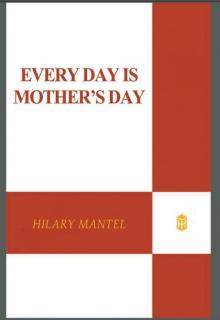 Every Day Is Mother's Day
Every Day Is Mother's Day An Experiment in Love
An Experiment in Love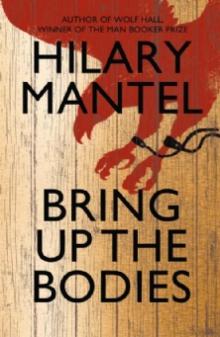 Wolf Hall
Wolf Hall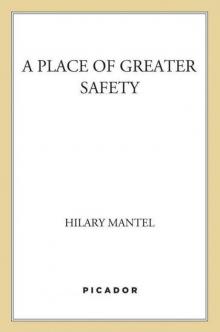 A Place of Greater Safety
A Place of Greater Safety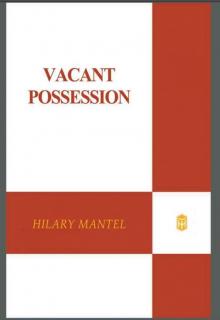 Vacant Possession
Vacant Possession The Giant, O'Brien
The Giant, O'Brien Beyond Black
Beyond Black Ink in the Blood: A Hospital Diary
Ink in the Blood: A Hospital Diary The School of English
The School of English Giving Up the Ghost
Giving Up the Ghost The Mirror and the Light: 2020’s highly anticipated conclusion to the best selling, award winning Wolf Hall series (The Wolf Hall Trilogy, Book 3)
The Mirror and the Light: 2020’s highly anticipated conclusion to the best selling, award winning Wolf Hall series (The Wolf Hall Trilogy, Book 3) Fludd
Fludd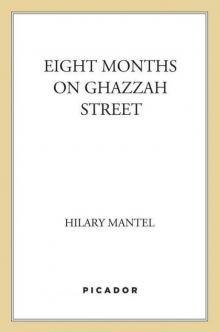 Eight Months on Ghazzah Street
Eight Months on Ghazzah Street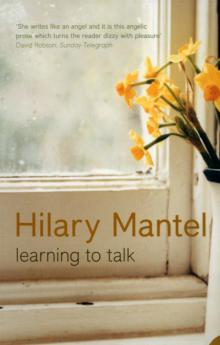 Learning to Talk
Learning to Talk How Shall I Know You?: A Short Story
How Shall I Know You?: A Short Story A Change of Climate
A Change of Climate Bring Up the Bodies
Bring Up the Bodies The Assassination of Margaret Thatcher: Stories
The Assassination of Margaret Thatcher: Stories Beyond Black: A Novel
Beyond Black: A Novel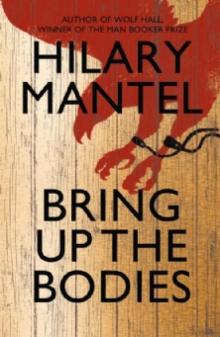 Wolf Hall: Bring Up the Bodies
Wolf Hall: Bring Up the Bodies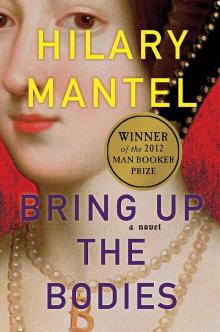 Bring Up the Bodies tct-2
Bring Up the Bodies tct-2 Ink in the Blood
Ink in the Blood The Assassination of Margaret Thatcher
The Assassination of Margaret Thatcher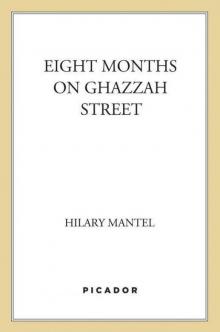 Eight Months on Ghazzah Street: A Novel
Eight Months on Ghazzah Street: A Novel How Shall I Know You?
How Shall I Know You? A Change of Climate: A Novel
A Change of Climate: A Novel The Giant, O'Brien: A Novel
The Giant, O'Brien: A Novel Fludd: A Novel
Fludd: A Novel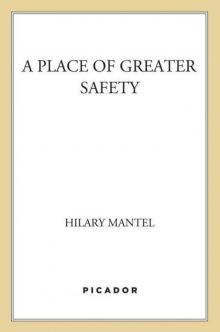 A Place of Greater Safety: A Novel
A Place of Greater Safety: A Novel An Experiment in Love: A Novel
An Experiment in Love: A Novel